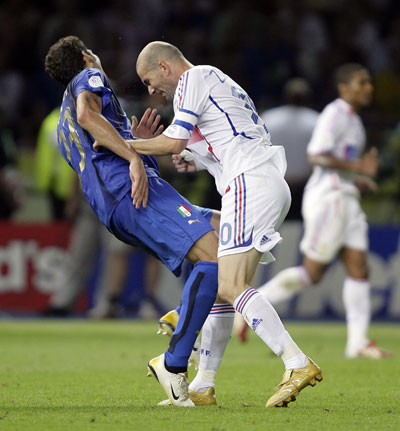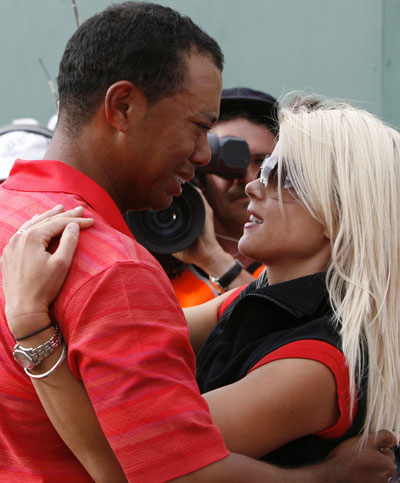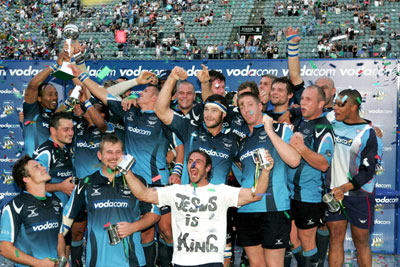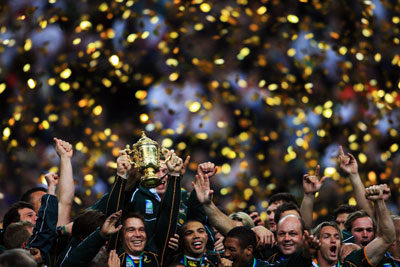A look at a sporting decade that made heroes but also cut some giants down to size.
The good
2004: World Cup 2010 bid win
History will be made when South Africa hosts the Fifa World Cup for the first time next year. The euphoria that gripped the country in May 2004 shortly after South Africa won the right to host the 2010 finals easily stands out as the most spirited sporting moment in the past 10 years for Africa.
”Fifa made the right decision. Let’s all go out and celebrate,” the BBC quotes an unusually jubilant then-president, Thabo Mbeki as he waved a glass of champagne. But it was the old Madiba Magic that played a big part in bringing the biggest sporting event in the world to Africa for the first time. At that moment, as millions celebrated in the streets and at home – reminiscent of the first democratic elections – the disappointment of losing out to Germany by a single vote in 2006 was at last erased.
Billed as favourites before the draw, South Africa cruised to a 14-10 victory over Morocco. Fittingly, Madiba led the delegation and celebrations in Zurich went on all night after Fifa president Sepp Blatter announced the winner. A widely used image of Mandela lifting the World Cup trophy with a beaming Archbishop Desmond Tutu next to him is fondly remembered by sports fans. It is a picture that sums up the emotions of Africans. Finally, their time had come.
Lance Armstrong
When Lance Armstrong returned to competitive cycling in January 2009, his became one of the greatest comebacks in sport. He had achieved just about everything there was to achieve as a sportsperson earlier in his career.
Besides many other garlands, the United States cyclist is remembered for winning the Tour de France a record seven times on the trot between 1999 and 2005. Armstrong is the only man with seven wins, having broken the previous record of five victories, shared by Miguel Indurain, Bernard Hinault, Eddy Merckx and Jacques Anquetil. His feat is even more remarkable in light of his riding out a life-threatening illness. Armstrong survived testicular cancer and a tumour that spread to his lungs and brain in 1996. He was already coughing blood on his first visit to the urologist and his chances looked grim, with doctors giving him a 40% chance of survival.
It is no wonder that the motivation behind his return to cycling was influenced by this painful history. ”After talking to my children, my family and my closest friends, I have decided to return to professional cycling to raise awareness of the global cancer burden,” Armstrong said on his website.
On his return Armstrong finished third in the 2009 Tour de France and became the second-oldest rider to get on to the podium. His team, Astana, swept to victory, while teammate Alberto Contador won the race. Armstrong has announced his intention to win the Tour de France in 2010.
2007 Rugby World Cup final
South Africans will always cherish the day when the Springboks lifted the Webb Ellis trophy for the second time. They first won it in 1995.
The Springboks beat England 15-6 in a tense final that kept fans on the edge of their seats at Stade de France in Paris. Not a single try was scored on the day, but Percy Montgomery kicked his team to victory after converting four penalties. Montgomery, who also didn’t miss a kick in the semifinal, finished the tournament as the highest points scorer, while Springbok winger Bryan Habana ended on top of the try-scoring table.
The team, which played the final with 668 caps to their credit, was the most experienced South African rugby team to be fielded. South Africa joined Australia as the only two-time winners of the Rugby World Cup.
2007 Super 14 Final between Blue Bulls and Natal Sharks
With the Springboks winning the rugby World Cup and the Blue Bulls winning the Super 14 cup, 2007 was a good year for South African rugby.
Each year five teams from New Zealand, four Australian teams and five South African teams meet in what has become known as the clash of the titans in Southern Hemisphere rugby.
In May the Blue Bulls and the Natal Sharks made history when they both booked their places in the Super 14 final. It didn’t matter who won on the day, the trophy would remain in the country for the first time.
The sold-out final was a nail-biting affair with Sharks dominating most of the match. The Sharks looked certain to win it but Bryan Habana scored a last-minute try for a 20-19 Bulls victory. Habana was named Player of the Year.
Lightning Bolt
Usain Bolt is arguably the greatest athlete to have put on a pair of running shoes. The Jamaican holds the world record for the 100m, 200m and, with his teammates, the 4x100m relay. He is the Olympic record holder for all three events.
Bolt’s speed and cocky celebration antics have revived interest in the sport. As a result of his success on the track, the athlete nicknamed Lightning Bolt was named the Laureus World Sportsman of the Year for 2009 – a deserved reward for the first man to run the 100m in under 9.7s. He may have jogged to the finish line in the Beijing 100m but he knew it needed something special to better Michael Johnson’s 200m dash time of 19.32s. There was none of the customary arrogance throughout the race. Although he had a 5m lead, he still dipped his head and only glanced at the clock after crossing the finish line. It read 19.30s and in that moment of brilliance the world failed to find superlatives to describe this ”super human”.
Greece at 150-1 win Euro 2004
Greece had never won a match at a major championship but departed from Euro 2004 as shock European champions. It wasn’t pretty but the 150-1 outsiders triumphed the hard way, having become the first team to beat both the holders (France) and the hosts (Portugal – twice) in the same tournament. These underdogs were functional rather than flamboyant and so remained largely unloved and widely written off at every step of their historic march. Yet Otto Rehhagel’s humble troops continually exposed the shortcomings of more vaunted opponents and the snobbery of many fans. – Media & Guardian News
Golf (2008)
It was no April Fool’s joke when Trevor Immelman became the first South African to wear the famous green jacket since Gary Player in 1978. Player won it in 1961, 1974 and 1978. Immelman beat Tiger Woods by three strokes to win the US Masters Open. His victory at Augusta National Golf Club in Georgia was arguably the best sporting achievement in a year (2008) that was filled with disappointments. Bafana Bafana had failed to qualify for the 2010 Africa Cup of Nations and only one medal was won at the Beijing Olympics.
Comrades Marathon
The Comrades Marathon, which has become a Mecca for runners, is always a spectacular and colourful event attracting thousands of athletes from across the country and beyond. Leonid Shvetsov, a Russian born ultra-runner and medical doctor, broke both the up and down records for two consecutive years – 2007 and 2008.
This was one of the highest watermarks in the history of this tough race as the records stood for 20 years, bringing to an end Bruce Fordyce’s era of eight consecutive wins between 1981 and 1989.
The marathon will, however, also be sadly remembered for two runners who collapsed and died at the finish line in 2006. In the same year another bad chapter was added after Wally Hayward, one of the few and highly decorated senior runners, died on April 28.
Hayward won the Comrades Marathon several times between 1930 and 1950, with his first victory at the age of 21 in 1930. He ran his last Comrade race in 1988 when, at age 79, he shocked everyone by finishing the race, clocking 9:44:45. — Thabo Mohlala
The ugly
Ellis Park stadium disaster
April 11 2001 will be remembered as the saddest day in the history of South African football. The autumn evening started with fans looking forward to another exciting Soweto derby between Kaizer Chiefs and Orlando Pirates.
In the opening stages the match lived up to expectations with Chiefs scoring early. Pirates later equalised and a stampede ensued as people jostled for a glimpse of the exciting action. Police fired teargas to disperse a large crowd that had gathered outside, trying to force their way in. In the mayhem 43 people — including children — were killed. The match was stopped and bodies were laid on the pitch and covered with blankets. It was a dark day.
Disaster in Ivory Coast
Didier Drogba is captaining a galaxy of stars that include Arsenal’s Kolo Touré and Emmanuel Eboué, Chelsea’s Salomon Kalou and Tottenham’s Didier Zokora. But their road to next year’s World Cup is tainted by a stadium disaster that left 22 fans dead.
A wall collapsed and crushed supporters as they tried to get closer to the footballers during a March 2009 World Cup qualifier against Malawi in Abidjan. Another 130 were injured. Adding to the horror, the match continued and the Elephants extinguished Malawi’s Flames 5-0, despite the bloodbath.

Drogba, who scored twice, later told the BBC that they would have stopped playing if they had been informed about the accident. Players learned of the tragedy only after the game.
The bad
Hansiegate
The late South Africa cricket captain’s fall from grace is among the biggest stories of this decade. After a successful sporting career, Hansie was implicated in a match-fixing scandal that involved taking money to throw matches. He later admitted to the crime, claiming the ”devil made me do it”.
He was subsequently banned for life from the sport that gave him fame and fortune. Yet, in 2004, the former cricketer was named as the 11th greatest South African, long after being found guilty of match-fixing.
The tragic tale of his life ended in a plane crash in 2002. A biographical film called Hansie, written by his brother Frans, was released in 2008.
Ras Dumisani
He might not be the worst person sport has seen but Ras Dumisani triggered a flurry of outrage when he butchered the national anthem in France.
Plucked from obscurity to sing the national anthem ahead of an international friendly in Toulouse, the reggae musician clearly did not know all the words – and could not hold a note. While he maintained that he had sung ”beautifully”, the nation was mortified. The Springboks even blamed the Durban-born musician for their loss to France.
Ironically, it is reported that the musically challenged Ras has an album to his name and that one of the tracks on it is the national anthem.
Caster Semenya
Caster Semenya showed the world a clean pair of heels when she stormed to victory in the 800m track event at the 2009 World Championships. Little did she know that it would culminate in the most intrusive period of her young life.
Instead of being hailed as the new queen of the track, questions arose. Is she a man or woman? Her crime was that she looked and talked like a man.

The South African was subjected to humiliating gender tests at home and in Germany, the venue of the World Championships. Athletics South Africa (ASA) president Leonard Chuene vehemently denied knowledge that tests were conducted on the 800m champion, but he was later forced to admit that he lied after a Mail & Guardian exposé.
Leaked information about the tests to the international media politicised the issue further, with Sports Minister Makhenkesi Stofile threatening to declare ”World War III”. Lies, mismanagement and betrayal stole the thunder from an outstanding achievement as speculation over Semenya’s gender took centre stage. Although results of her tests have not been made public, there have been claims that she is hermaphrodite.
Chuene, the man largely responsible for her misery, has been suspended from heading ASA but has — shamelessly — not resigned.
Tigergate December 2009
The actual figure may be debatable. Still claims that golf’s ”gentleman” Tiger Woods may have sunk as many as ”10 birdies” behind his wife’s back have battered the golfer’s squeaky-clean image and the sport at large.
As revelations of the star’s sordid life unfolded, it emerged he may have slept with as many as 10 women. The timing of his conquests, who allegedly include a porn star and several waitresses, has also left the sport world shell-shocked. It is reported that some encounters took place while his wife was pregnant and the week his son was born, according to ABC News.
Tiger’s apology for his ”transgressions” sounded empty as skeletons continued to tumble out of the cupboard. Although his story has become the basis of most pub talk, Tiger’s downfall has been sad for fans who once viewed him as a role-model family man.

Heartbreaking biographies
Two sporting heroes, Springbok star Joost van der Westhuizen and US tennis great Andre Agassi, are smiling all the way to the bank, thanks to spicing up their biographies with confessions that may have broken their fans’ hearts.
In his book, Joost: The Man in the Mirror by David Gemmell, the rugby star finally admits to cheating on his wife, Amor. ”Just over three years ago I made the biggest mistake of my life. I did something I will probably regret [for] the rest of my days. Against all my principles, I had a sexual liaison. And we took drugs,” his book reads.
It was his first confession that he was the man in the video splashed in Heat magazine in February ”wearing socks and underwear”.
Joining Joost in selling his book is Andre Agassi. In an obvious ploy to generate interest in his book excerpts that he used to get high on crystal meth and wore a wig were released. It worked. Fans may have been shattered but both biographies sold like hot cakes.
World Athletics Championships in Osaka (2007)
South African athletes gave a disappointing performance after they failed to bag a single medal at the championships in Osaka.
The best finish by a South African came in the men’s long jump when Khotso Mokoena claimed fifth place with a distance of 8.19m. He reached the final with the best jump of the qualifiers of 8.28m.
The country’s biggest medal hopeful, Mbulaeni Mulaudzi, ranked number one in the world in the 800m, struggled in the final of the race and finished seventh.
Zidane’s headbutt
Zinedine Zidane is undoubtedly among the greatest football players, probably the best talent of the past decade. Yet the end of his glittering career would be remembered for his foolish act in the 2006 World Cup final.
Fifa had just named him the player of the tournament before the kick- off of the final between France and Italy. Little did they know that their golden child would bring the whole tournament into disrepute in one moment of madness.
Zidane was sent off in extra time after headbutting Italian player Marco Materazzi. He claims the Italian verbally abused him. He did not take part in the penalty shootout that Italy won 5-3.
Marco Antonio Barrera vs Mzonke Fana
The stage was set. A sea of red, green and white Mexican flags draped the walls up to the rafters – to the furious lilting strings of the mariachi. It was the evening of April 9 2005 in El Paso, Texas.
This was the night then-South African featherweight champion and mandatory challenger Mzonke Fana must hate to remember; it was the most disappointing fight of his entire career.
This was Marco Antonio Barrera’s first defence of his newly won title. He was the WBC Super Featherweight champion.

Barrera promised a sterling performance for the Mexican community of El Paso to overjoyed chants of viva la raza. The pundits said: ”It looks as if Mzonke Fana, a lightly regarded South African fighter, will provide the next challenge for Barrera to conquer.”
Back home, Fana was loved for his resilience. He got his chance to fight Barrera in an eliminator after beating Randy Suico, having been sent to the canvas on two occasions during the fight. Much was expected from the Nic Durandt guy.
The first round of the title fight saw a nervous Fana wobbling to Barrera’s one-two combinations and easy jabs.
Round two, Fana tried to jab uncontrollably but continually hit the air – Barrera was untouched. The Mexican combined magnificently and effortlessly. Fana fell face down, seemingly unconscious. The referee did not bother to count him out; Fana was out cold.

The all-knowing pundits concluded: ”This was one of the worst pay-per-view cards in recent memory.” — Monako Dibetle